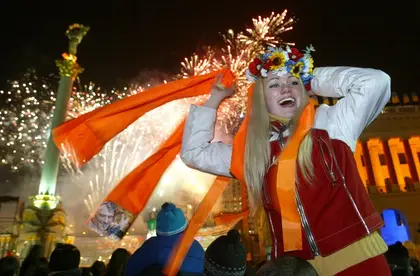Prime Minister Viktor Yanukovych and opposition candidate Viktor Yushchenko. A consortium of exit polls funded by Western governments give Yushchenko the lead, while the official tally puts Yanukovych ahead.
Nov. 22
With over 99 percent of the official vote tallied, it appears likely that Yanukovych will be declared the winner, taking 49.42 percent of the vote to 46.7 for Yushchenko, who disputes the results and calls on citizens to take to the streets in protest. Putin congratulates Yanukovych on his apparent victory.
Nov. 23
Yushchenko publicly claims victory and takes a symbolic oath of office in parliament. President Leonid Kuchma calls for negotiations between the two sides to end the crisis.
Nov. 24
Yushchenko calls for a national strike. Kuchma accuses opposition of staging a coup d’etat. The United States announces that the official election results are illegitimate.
Nov. 25
Yushchenko appeals to the Ukrainian Supreme Court to void the election results. The court agrees, delaying official election certification. The EU calls for peaceful resolution of the political crisis.
Nov. 26
European envoys arrive in Kyiv to meet with Yanukovych, Yushchenko and Kuchma. Opposition supporters surround the Cabinet building, preventing Yanukovych’s staff from going to work.
Nov. 27
Parliament declares the election results invalid, and representatives for both candidates meet. EU leaders recommend holding new run-off elections.
Nov. 28
Presidentially-appointed governors of eastern Ukrainian oblasts (Luhansk, Donetsk, Kharkhiv) hold rallies calling for autonomy. Yushchenko’s supporters call on Kuchma to fire Yanukovych. Kuchma asks the opposition to end the government building blockade in Kyiv as hundreds of thousands of demonstrators continue street protests.
Nov. 29
The Supreme Court begins hearing Yushchenko’s complaints. Kuchma, meanwhile, proposes starting the presidential election process all over again, from scratch. Yanukovych’s campaign chief Serhiy Tihipko resigns. Yanukovych warns that the country could break up if Yushchenko refuses to compromise.
Nov. 30
A second round of European-mediated talks breaks down after Yushchenko’s supporters walk out. The Donetsk region distances itself from the idea of self-rule. Yanukovych says he would be willing to hold another election, provided Yushchenko wouldn’t run. Russian President Putin warns that foreign governments must not get involved in the crisis.
Dec. 1
Parliament passes a no-confidence vote in Prime Minister Yanukovych’s government. EU-brokered talks continue.
Dec. 2
Kuchma and Putin meet in Moscow, where the Russian leader rejects the idea of holding a new run-off. U.S. President Bush says there should be no outside interference in any future election. France, Germany and the European Union repeat calls for holding a repeat run-off election
Dec. 3
Supreme Court rules to throw out the fraudulent run-off results and sets Dec. 26 as the deadline for a new vote. Yushchenko asks demonstrators to stay in Kyiv until parliament redacts the election law to prevent electoral fraud.
Dec. 4
Parliament fails to pass legal changes to prevent fraud in the new run-off elections ordered by the Supreme Court. President Leonid Kuchma accuses the opposition of reneging on compromise agreements, calling for foreign mediation of the crisis.
Dec. 5
Yushchenko says that he has begun campaigning for the third round of voting. He urges quick election law reform to ensure fair elections.
Dec. 6
Yushchenko, Yanukovych and Kuchma meet with representatives of the EU to hammer out a compromise on election law reform and limiting presidential powers. No agreement is reached.
Dec. 7
The government and the opposition remain deadlocked on election law reform. The OSCE begins gearing up to observe the Dec. 26 elections by pledging to send 1000 election observers.
Dec. 8
Some 402 deputies support the simultaneous adoption of constitutional reforms and changes to the law on presidential elections to prevent fraud that occurred in the Nov. 21 run-off vote. Absentee ballots for the third round of presidential elections will be limited; election commissions will put a stamp on the personal identification papers of each absentee voter and will be banned from making changes to voter lists on election day. Only disabled persons, people who are “unable to move on their own power,” will be allowed to vote at home.
You can also highlight the text and press Ctrl + Enter



